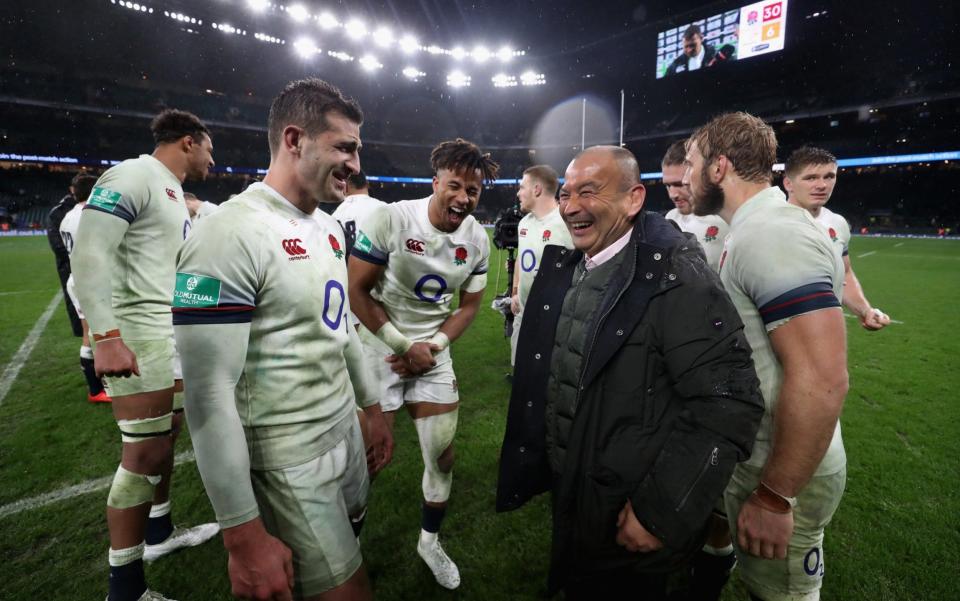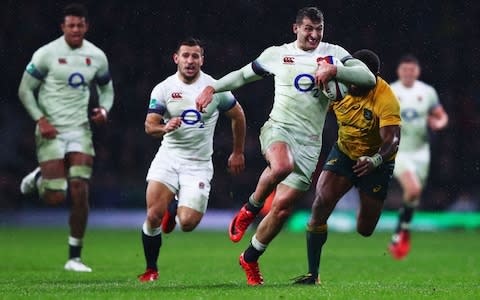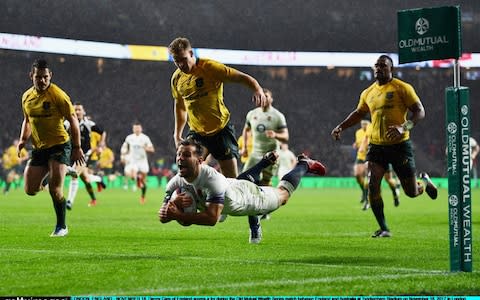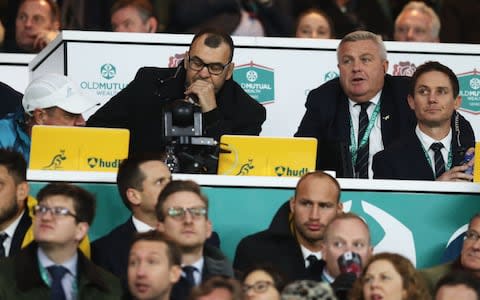England's strong finish at Twickenham down to Friday run work, reveals Jonny May

England’s ability to score three tries in the final eight minutes may have distorted the record 30-8 scoreline in a fifth successive victory over Australia, but it had its roots in the conditioning programme that began in the balmy conditions in Portugal three weeks ago and climaxed with an intense speed session in the rain at Twickenham on Friday.
Eddie Jones, the England head coach, has made fitness one of the over-arching priorities for this autumn campaign to the point where the work done in Portugal and in the week leading into the Argentina game were about peaking on Saturday.
Jones switched training last week from a draining four-day week to intense sessions on Monday, Wednesday and Friday, with two days off.
Wednesday was the heaviest session but interestingly the captain’s run on Friday was more than just the traditional team run but as Jonny May, described it, a “fast session”.
“It’s actually a proper session,” said May, who made a massive impact on his return to the starting XV after recovering from a hamstring injury, scoring the second of the three late tries and creating the third for super-sub Danny Care as what had been a tense, drama-laden context in monsoon-like conditions became a record defeat for Australia in a blur of white.

“We warm up, do a few explosive things, a few sprints. It’s a good session; it’s not fatiguing and it gets you fired up almost for the next day. You’re always tired after Wednesday, but the way we recover here, and the way the Friday session works, we’re the fitter team on the day, maybe.”
“The other thing to say on that is I think when you come into camp, you get a shock. Like I tweaked my hamstring; it’s a step up from what you do at club.
“We’re expected to train hard and fast and accurately every single day. The first week or two it can drain you a little bit, you can feel tired but you adapt by the second or third week. And you start to feel the benefits of training that little bit harder, and I think that’s where we were [against Australia].

For Jones, winning the battle of the fine margins was a just reward for his squad's effort.
“We trained for that; we trained to finish that last 20 hard, whether that was the starting guys or the finishing guys,” said Jones.
“Last week we didn’t train much. Well, we trained a lot but not for rugby, because these Lions players still aren’t fit and that’s the battle I’ve got. They were better today and they will be better next week if they play. We’ve got to get more work into them.”
There is no doubt that Australia’s fatigue in that final quarter was in part due to having to play with 13 men for a period after both Michael Hooper and Kurtley Beale were shown yellow cards.

Yet there can be no excuse for Beale, who appeared to canter to the ball as it bounced towards the touchline only for Elliot Daly to keep it in with a chip-kick to the line which allowed the Wasps wing to score the try that summed up England’s commitment and desire.
That it came just seconds after Australia looked like they might have finally converted one of their numerous try-scoring opportunities only heightened the Wallabies’ frustration, captured by the regular outbursts from their coach Michael Cheika.
Tevita Kuridrani had seared through the broken field only for his offload to Samu Kerevi to go to ground because of May’s pressure.
Ford gathered possession and Ben Youngs’ immediately turned defence into attack with a perfectly-placed clearance kick and Daly’s chase and footballing skills did the rest.

With the game still in the balance, it was the killer blow. The blitz of scoring at the end, started by Jonathan Joseph’s sliding try from Care’s over-the-top chip, underscored England’s ruthless instinct.
With Australia seemingly distracted by the TMO decisions that went against them, the harshest of which was to deny Hooper a try for being in an offside position though he had checked his run, England wanted it more.
The defensive effort was equally impressive, with Joe Launchbury topping the charts with 19 tackles, closely followed by Maro Itoje with 16, out of a total of 130 to just 82 by Australia, who were restricted to penalties by Reece Hodge and Bernard Foley.

“It’s about the confidence that they know that they’ve trained at a higher intensity than the game, so they know they can go hard,” added Jones. “They know that they can chase kicks, get back and go again. Elliot Daly’s try was the best example of just working hard off the ball.
“We attacked down the right-hand side and kicked. Beale got the ball, passed to Kerevi and Kerevi made a 60-metre line-break. We then turned that into a try-scoring opportunity.
"Those are the sort of things that win Test matches. That was a great piece of work by Elliot, but Benny Youngs got back and a lot of people got back to help to create that situation.
“It comes down to work ethic and habit. You either create good habits or bad habits. We’ve got some good habits and we’ve got some bad habits as well.”
On Saturday, there were plenty more good than bad on show.

 Yahoo Sport
Yahoo Sport 





































